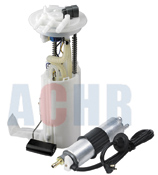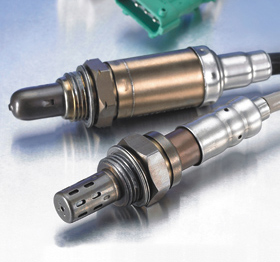Booming Auto Market Bolsters China's Auto Electronics Manufacturers
2010/03/08 | By CENSThe lucrative business opportunities generated by China's burgeoning auto market has stimulated rapid development of the automotive electronics industry there. For five years in a row, to 2007, the industry chalked up growth rates of over 30%, bringing production value to 121.57 billion renminbi (RMB) that final year. From an expansion of more than 40% in 2007, growth slipped to just 15.6% in 2008 because of declining car sales, bringing the overall value to 140.5 billion RMB; then, when China replaced the United States to become the world's biggest auto producer and market in 2009, production value skyrocketed by 50.2% to reach 211.1 billion RMB.
The growth has been especially striking in the auto entertainment system business, which might be represented by such firms as the Hangsheng Electronics Co. and Jiangsu Toppower Automotive Electronics Co. Development has also been exceptionally robust in the air-bag, security system, and navigation system segments, with such enterprises as the Jinzhou Jinheng Automotive Safety System Co. and Shanghai East JoyLong Motor Airbag Co. producing air bags; the Chinagps Co., Shenzhen Huaqiang Information Industry Co., and Beijing Anitrong Science & Technology Co turning out GPS navigation devices; and the Steelmate Co. and Shenzhen Terca Technology Co. making security systems.

A few leading technology firms, such as the Beijing Troitec Automotive Electronics Co., have ventured into the more advanced field of engine management systems (EMS) and have begun supplying their products to carmakers such as Chery Automobile.
The destructive impact of the global financial tsunami on international supply chains in the automotive industry opened up new opportunities for Chinese newcomers that offer more competitive costs than their foreign counterparts.
Some of China's top universities—Tsinghua, Tongji, Shanghai Jiao Tong, Beijing Institute of Technology, and Beihang, among others—have also become involved by engaging in research on the most advanced of automotive technologies. They have created many technologies and products that have already been commercialized, including EMS, chassis and body control, CAN-BUS, intelligent-vehicle technologies, and hybrid electric vehicle (HEV) and battery electric vehicle (BEV) technologies.
State-sponsored research institutions are also in the game and have achieved some initial successes in such areas as auto engines, automatic transmissions, batteries; the key components of fuel injectors, variable valve timing, clutches, and hydraulic valves; and electric propulsion and power-control units, chassis and safety systems, and body and vehicle networking control systems.
Auto-electronics suppliers in China work out systems that can fully match vehicle structures and meet functional requirements in line with trends in automobile design there. Throughout the overall vehicle development process, automakers, design companies, and suppliers work closely together so that they can come up with all the needed systems and parts at the same time.
When an automotive-industry company wants to set up a comprehensive R&D system in-house, it has to take a number of factors into consideration: the formation of a high-quality development team; the provision of a comprehensive quality control system and products with a reputation for reliability; the establishment of a comprehensive set of software/hardware development platforms, development management processes, and testing and inspection equipment and methods; frequent participation in high-level international technical seminars and forums, and the building up of communications channels with international companies and standard-setting organizations so as to secure access to the latest standards and market trends; and active liaison with domestic and overseas automakers so as to secure orders and accumulate engineering experience and know-how.

To assure its continued rapid development, the auto electronics industry in China will have to win the support of most of the independent automakers there, and the top firms in the line should participate directly in their clients' auto development projects. The joint-development process will give auto electronics makers a chance to develop products that truly meet the needs of automakers, and to gain the experience and know-how they need to develop products that are truly competitive in the market, in terms of both quality and cost.
China's independent automakers face fierce competition from foreign brands that are often seen to have better quality. Their auto electronics suppliers will have to help them overcome this problem by providing good-quality, reliable, and cost-competitive products.




